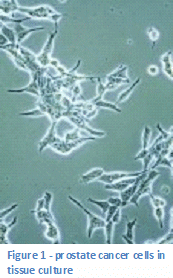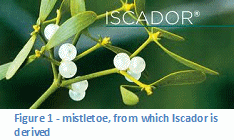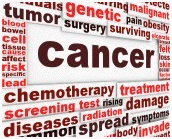Chemo, surgery, radiation - this is the mantra of current recommendations for cancer therapy. Treatment options on the website of the Mayo Clinic, “the most innovative, progressive care anywhere” are the following: bone marrow transplantation, chemotherapy, radiation therapy and radiofrequency ablation.[1]
And yet… the incidence of cancer is projected to rise 75% by the year 2030.[2] What is wrong with this picture?
The National Cancer Institute describes side effects of conventional chemotherapy
on its website.[3]
Some common side effects from chemotherapy are fatigue, nausea, vomiting, decreased blood cell counts, hair loss, mouth sores, and pain… Sometimes, chemotherapy causes long-term side effects that do not go away. These may include damage to your heart, lungs, nerves, kidneys, or reproductive organs. Some types of chemotherapy may cause a second cancer years later.
The website does not mention death from destruction of the immune system and systemic infection.
Chemotherapy is actually pretty effective for a few cancers.[4] Greater than 10% survival can be attributed to cytotoxic chemotherapy in the following cancers: cervix 12%, ovary 8.7%, testicle 41.8%, Non-Hodgkins Lymphoma 10.8%, Hodgkins Lymphoma 35.8%. Breast cancer gets only 1.5% survival increase from chemotherapy, colon cancer 1.8%, brain cancer 4.9%.
Why are we so quick to put conventional chemotherapy first on the list for cancer treatment? Graeme Morgan, an Australian radiation oncologist, writes: “For most patients, the use of cytotoxic chemotherapy is for the palliation of symptoms and to improve quality of life.” However, Dr. Morgan concludes: “The overall contribution of curative and adjuvant cytotoxic chemotherapy to 5-year survival in adults was estimated to be 2.3% in Australia and 2.1% in the USA.”[4]
If conventional chemotherapy were less toxic, it might be worth it. But for a 2.5% benefit? It is hard to discern the advantages.
Most people are not aware that there is a gentler form of chemotherapy, known as Insulin Potentiation Therapy, low dose.[5,6] This therapy is just as effective as standard chemo, without all the painful and sometimes lethal side effects. Insulin is used to lower the blood sugar, resulting in relatively increased starvation of cancer cells which require more sugar than normal body cells. Once the blood sugar is sufficiently low, sugar is given intravenously, along with a small dose of chemo (about 10-15% the usual dose). The chemo is sucked into the cells, along with the sugar, and concentrates in cancer cells because they are so much more avid for sugar than normal cells.[7,8]
With IPT, the incidence of so-called side effects is markedly decreased. Most of our patients drive themselves home from treatment. They may report a little fatigue on the day of treatment. Seldom do they lose any hair at all, and they hardly ever drop their white blood cell counts. They are able to lead normal lives during the course of their IPT therapy.
If our therapies are so effective, why is the incidence of cancer projected to rise so dramatically? And why are the therapies in fact not effective for every form of cancer?
 Our bodies are full of toxins - chemicals from our foods and from the air
we breathe, artificial colorings and flavorings, artificial sweeteners
(like chlorinated hydrocarbons, or pesticides), high levels of sugar with
consequent high levels of insulin, or even frank diabetes. So it is not
surprising that mutations can occur. That is the essence of cancer. The
cells mutate to a lower state of being, one where they are only concerned
with growth, and not with the good of the entire organism.
Our bodies are full of toxins - chemicals from our foods and from the air
we breathe, artificial colorings and flavorings, artificial sweeteners
(like chlorinated hydrocarbons, or pesticides), high levels of sugar with
consequent high levels of insulin, or even frank diabetes. So it is not
surprising that mutations can occur. That is the essence of cancer. The
cells mutate to a lower state of being, one where they are only concerned
with growth, and not with the good of the entire organism.
Insulin Potentiation Therapy - even low dose - is NOT ENOUGH in and of itself to treat cancer, any more than chemotherapy by itself is a sufficient treatment. For truly integrative cancer therapy, many different modalities are brought into play.
It is helpful to know which chemotherapy to use - which actually kills your cancer cells, not just which has been studied and had a good effect on 30% or 50% of people in whom it was tried. It is equally helpful to know which complementary - botanical and supplemental - therapies could be therapeutic.
Chemosensitivity testing is available - but not in these United States, unfortunately. We use a laboratory in Greece, run by an oncologist, to determine which drugs and which supplements to use for the greatest effect.
-
 We use standard chemotherapeutic agents - and sometimes even standard combinations
as recommended in the current oncology literature.[9]
We use standard chemotherapeutic agents - and sometimes even standard combinations
as recommended in the current oncology literature.[9]
-
We use botanical remedies like Iscador[10], and supplements like high dose
Vitamin C[11] (but not if bortezo mib is part of the regimen chosen[12],
lipoic acid[13], glutathione[14] and many others, to restore the function
of natural killer cells, and to bring the body back to a
 state where it can defend itself against the foreign cancer cell invaders.
state where it can defend itself against the foreign cancer cell invaders.
- We teach our patients the basics of a healthy diet - encouraging mainly plant-based foods[15] in the early phases.
- We test for nutrient deficiencies, and administer nutrient IV therapies to replenish the body’s stores.
-
We work with our patients to help them
dismantle barriers to healing - old dogma, old
 conflicts, old
beliefs, old injuries, physical or emotional, which they have been unable to see
or unwilling to give up.
conflicts, old
beliefs, old injuries, physical or emotional, which they have been unable to see
or unwilling to give up.
- [1] Downloaded 12/2/2012 from https://www.mayoclinic.org/tests-procedures/cancer-treatment/care-at-mayo-clinic/pcc-20393350 [2] Bray F, Jemal A, Forman D et al. Global cancer transitions according to the Human Development Index (2008-2030): a population-based study. The Lancet Oncology, Volume 13, Issue 8, Pages 790 – 801, August 2012 [3] Downloaded 12/2/2012 from http://www.cancer.gov/cancertopics/coping/chemotherapy-and-you/page5 [4] Morgan G, Ward R, Barton M. The contribution of cytotoxic chemotherapy to 5-year survival in adult malignancies. Clin Oncol (R Coll Radiol). 2004 Dec;16(8):549-60.
As with any medical therapy, it is unwise to throw out everything, because each form of therapy has its use. Chemotherapy does indeed kill many cancer cells. High dose Vitamin C kills many others. Anti-inflammatory supplements and spices help to restore balance to the immune system. Nutrients help to sustain the body in its battle. And release of old stuff helps to restore the soul to a place of gratitude and love.
Every modality plays a part in our therapies. We are honored to share the journey with our patients. We would prefer to share the journey earlier in its course rather than later, when the immune system is already gone, and the body is in desperate straits.
 Standard chemotherapy is like a bomb exploding, creating collateral damage
to the organism. Insulin Potentiation Therapy, when combined with Integrative
and Functional Medicine Therapy, is a lifeline to help restore physical
function and enable the body to heal.
Standard chemotherapy is like a bomb exploding, creating collateral damage
to the organism. Insulin Potentiation Therapy, when combined with Integrative
and Functional Medicine Therapy, is a lifeline to help restore physical
function and enable the body to heal.
For more information about our integrative cancer care, please visit http://arizonaadvancedmedicine.com/cancer-overview/.
